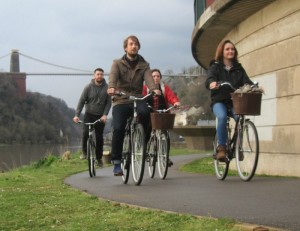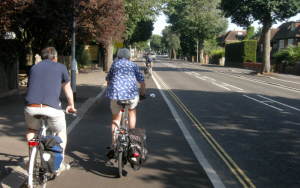What does the future hold for cycle funding in West Sussex?
At this month’s West Sussex Cycle Forum meeting we were fortunate to have Roger Geffen MBE, CTC’s Campaigns and Policy Director as guest speaker. Ruth Fletcher offers her report.
The picture from the centre
WSCF members from around the county, including Horsham (represented by Ruth Fletcher, Peter Silburn and Mark Treasure), Chichester, Crawley, Bognor, Haywards Heath and Worthing came to County Hall North, Horsham to be briefed on what is happening at government level on cycling.
A “cycling revolution”
Roger explained that it is two years since David Cameron said he wanted a “cycling revolution”. Now, with the new Infrastructure Act, there is a legally binding commitment on the government to have a funded Cycling and Walking Investment Strategy (CWIS).
The CTC expects that, in December, after the forthcoming Autumn Statement, there will be an announcement of the 5 year funding for the CWIS. The draft CWIS will probably be produced in the spring with the final strategy coming in next summer.
Roger commented that the government is very clear that local authorities such as WSCC will need to show a financial commitment to cycling and walking in order to get the preferential funding. The majority of the government money is likely to be for capital investment with a smaller percentage of revenue money that reduces over time. It is expected that local authorities will have to show their commitment by putting up match funding for capital projects as well as most of the necessary revenue funding.
“The strong will get stronger and the weak will get weaker”
Roger believes that the problem for authorities like West Sussex is that the government will only spend money on places which have the political will. For those that do not, “increasing divergence will be a problem” and “the strong will get stronger and the weak will get weaker”. The CTC will be lobbying for 5-10% of local as well as national transport budgets to be spent on cycling.
Securing political will
His message to the cycle forums was that in West Sussex “it’s all about securing political will”.
Roger was very clear that starting to invest capital budgets in better cycling infrastructure is what is most needed: “Although ‘smarter choices’ measures are still pretty cost-effective, there are diminishing returns on revenue spending for cycling” [i.e. things like Bikeability training in schools, and workplace cycling challenges]. “What’s really effective is spending real amounts of money on capital investment.”
[This will be a challenging message in West Sussex where investment in cycling infrastructure is lagging far below other places such as London, Bristol, Brighton, Waltham Forest, Bournemouth, Leicester and Cambridge. Currently there is no budget for cycling infrastructure and the few schemes which have been carried out using external funds (such as the Horsham LSTF route) have suffered badly due to a lack of leadership and expertise within the county.]
Roger emphasised the need for cycling facilities to be built to better standards than has been the case in the past and pointed out that there is a role here for the government to move quickly to bring out unified standards so that we no longer have the confusion of different designs in different areas of the country.
Countering the myth that there is no money
Roger told forum members that “the real challenge is to counter the myth that there is no money”.
He believes that it will be important for local authorities to draw on health budgets. [There are huge and proven health benefits from enabling a higher level of cycling e.g. see this BBC report].
He said that it will be important for local authorities to tap their road maintenance funding stream to make improvements to cycling infrastructure part of their ongoing maintenance programmes.
Money from developers will need to be spent more effectively to include cycling. [This is an issue in West Sussex where s106 funds (developer contributions) have gone unspent or been diverted from cycling to public realm works.]
Cyclists and pedestrians have different infrastucture needs
He said the LEPs (Local Economic Partnerships such as, locally for Horsham, Coast to Capital) are the other big potential funding source.
The government’s decision to bundle cycling and walking together into one strategy received a cautious welcome from Roger. From a strategic point of view he feels it makes good sense but the real risk is that local authorities might try to treat cycling and walking as the same thing from an infrastructure point of view: “That’s the last thing we want”.
[Cyclists, pedestrians, the increasing number of elderly people in our population and those with disabilities all have interests in common – but simply bunging cyclists onto the pavement or pavement-style shared-use paths is good for nobody.]





Speak Your Mind